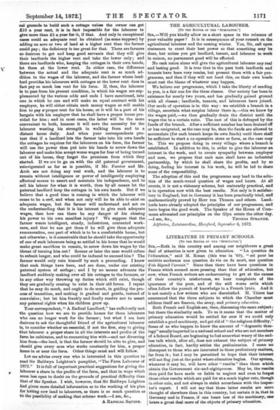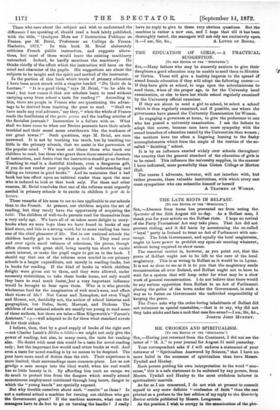LITERATURE IN PRIMAJtY SCHOOLS.
(TO THE EDITOR OF THE "SPECTATOR-1
SIR,—Both in this country and among our neighbours a great deal of attention is now given to education. "La question do Peducation," said M. Ronan (this was in '69), " est pour lea societes modernes une question de vie on de mort, une question d'on depend l'avenir." Since then there have been questions in France which seemed more pressing than that of education, but now, when French writers are endeavouring to get at the causes of their country's misfortunes, we bear complaints of the ignorance of the poor, and of the still worse evils which often follow the pursuit of knowledge in a French lycee. And it is not merely a few writers who are dissatisfied. M. Thiers has announced that the three subjects to which the Chamber must address itself are finance, the army, and primary education.
Both French and English are, then, discussing the same subject ; but there the similarity ends. To us it seems that the matter of primary education would be settled for ever if we could only establish a good machinery, and get rid of "the religious difficulty." Some of us who happen to know the amount of "dogmatic theo- logy" usually imparted in a national school and who are not members of a School Board, are beginning to feel somewhat weary of the end- less talk which, after all, does not exhaust the subject of primary education, in fact, hardly settles the preliminaries. I mean no disrespect to those who are interested in these preliminary matters, far from it ; but I may be permitted to hope that their interest will not flag just at the point where education begins. Our system, whatever it may be, will have other " results " than those which obtain the Government six-and-eightpences. May be, the results thus paid for have made us liable to neglect and even to forget those other results which are paid for at a much higher rate, though in other coin, and not always in strict accordance with the inspec- tor's report. I will not say that these latter results are more thought of elsewhere than in this country, but certain it is, that in Germany and in France, if one hears less of the machinery, one hears a great deal more of the objects of primary education.
Those who care about the subject and wish to understand the difference I am speaking of, should read a book lately published, with the title, " Quelques Mots stir r Instruction Publique en France, par M. Breal, Professeur an College de France. Hachette, 1872." In this book M. Breal elaborately criticises French public instruction, and suggests altera- tions, but most of these would leave the existing machinery untouched. Indeed, he hardly mentions the machinery. He thinks chiefly of the effect which the instruction will have on the mind and character of the pupils. His suggestions are about the subjects to be taught and the spirit and method of the instructor.
In the portion of this book which treats of primary education I have been much struck with a chapter headed "Du Goat de la Lecture." "It is a good thing," says M. Brea, "to be able to read ; but how comes it that our scholars learn to read without carrying away from school a taste for reading ?" According to him, there are people in France who are questioning the advan- tage to be derived from teaching the poor to read. "Shall we have made any real advance," say they," when the whole of France reads the feuilletons of the petite presse and the leading articles of the Socialist journals ? Instruction is a failure with us. What shall we have come to when our Breton peasants have their minds troubled and their moral sense overthrown like the workmen of our great towns ?" Such questions, says M. Breal, are soon answered. It is not by teaching too much, but by teaching too little in the primary schools, that we assist in the perversion of the popular mind. "We must not blame those who teach our children to read, but those who grant them these essential elements of instruction, and desire that the instruction should go no further. Teaching to read is a doubtful kindness, even a dangerous gift, if you do not render your pupils capable of understanding and taking an interest in good books." And he maintains that a bad book has less effect upon an habitual reader than upon the man who is induced to look at that book only. For these and other reasons, M. Breal concludes that one of the reforms most urgently needed in primary schools is to excite in children is goilt de la lecture.
These remarks of his seem to me no less applicable to our schools than to the French. At present, our children acquire the art of reading, but they rarely have the opportunity of acquiring the habit. The children of well-to-do parents read for themselves from a very early age. We have all of us taken more delight in story- books when we were boys than we have found in books of any kind since, and this is a strong word, for to some reading has been one of the chief pleasures of life. But in our national schools the children hardly get to know what a book is. They read over and over again small volumes of selections, the pieces, though often chosen with great skill, being mostly too short to excite much interest, or make the pupil eager to get on in the book. I should say that one of the reforms most needed in our primary schools is a larger expenditure, not merely in reading-books, but in books for reading. If the kind of books in which children delight were given out to them, and they were allowed, under necessary restrictions, to take these books home, not only would they learn to read much faster,;but a very important influence would be brought to bear upon them. Who is it who provide wholesome food for the imagination of rich men's sons, and affect their views of life ? Not Cse3ar and Xenophon, not even Virgil and Homer, not, decidedly not, the author of school histories and geographies, but Defoe, Scott, Marryat, and Dickens. The children of our national schools are usually too young to read some of these authors, but there are tales—litiss Edgeworth's "Parent's Assistant," e.g.—well adapted to do for them what standard novels do for their elders.
I believe, then, that by a good supply of books of the right sort —not Charles Lamb's Biblia a-biblia—we might not only give the power of reading, but also, in many cases, the taste for reading also. No doubt with most this would be a taste for novel-reading only ; but the important few would read other books as well. And even a taste for novel-reading is by no means to be despised. The poor have more need of fiction than the rich. Their experience is more limited, their surroundings more common-place. Let us not grudge a man escape into the ideal world, when his real world has so little beauty in it. By affording him such an escape we do much to protect him from the dangers which usually attend monotonous employment continued through long hours, danger to which the "young bands" are specially exposed.
Bat why trouble ourselves about such " results " as these ? Is not a national school a machine for turning out children who get the Government grant? If the machine answers, what can the managers have to do but to go on turning the handle? I really
have no reply to give to these very obvious questions. But the machine is rather a new one, and I hope that till it has beem thoroughly tested, the managers will not rely too exclusively upon.



































 Previous page
Previous page